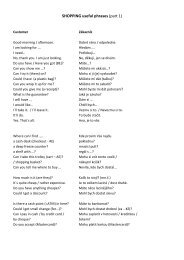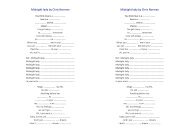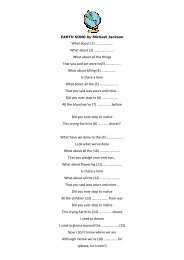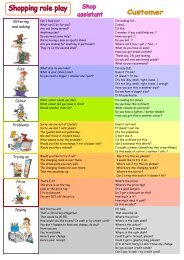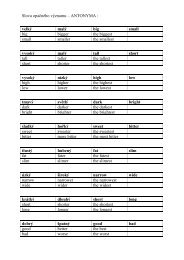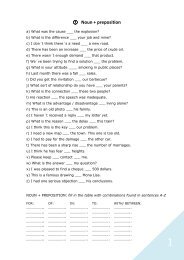all english tenses - table - englishcenter.cz
all english tenses - table - englishcenter.cz
all english tenses - table - englishcenter.cz
You also want an ePaper? Increase the reach of your titles
YUMPU automatically turns print PDFs into web optimized ePapers that Google loves.
TENSES<br />
PRESENT<br />
FORMS<br />
(Affirmative - A/Negative - N<br />
Question - Q)<br />
to be (am/is/are) + verb + -ing<br />
A: I am (I’m) working.<br />
He/she/is is (he’s) working.<br />
You/we/they are (we’re) working.<br />
N: I am not (I’m not) working.<br />
He/she/it is not (isn’t) working.<br />
You/we/they/ are not (aren’t) working.<br />
Q: Am I working?<br />
Is he/she/we working?<br />
Are you/we/they working?<br />
USE<br />
1-to talk about actions that are<br />
happening now, at the moment of<br />
speaking:<br />
Look! The boys are playing footb<strong>all</strong>. Hurry<br />
up! The train is coming.<br />
2- to talk about actions that are<br />
happening around now, but not<br />
exactly at the moment of speaking:<br />
We are studying very hard these days.<br />
We have to prepare for our exams.<br />
3-to speak about what you have<br />
already arranged to do:<br />
-What are you doing on Saturday?<br />
-I am meeting my friend at the station.<br />
She is arriving at 8 pm.<br />
TIME<br />
PHRASES<br />
now,<br />
at the<br />
moment,<br />
at present;<br />
Look!,<br />
Listen!<br />
these days,<br />
this<br />
morning,<br />
today<br />
CONTINUOUS (progressive)<br />
FUTURE<br />
PAST<br />
to be(was/were) + verb + -ing<br />
A: I was working.<br />
He/she/it was working.<br />
You/we/they were working.<br />
N: I was not (wasn’t) working.<br />
He/she/it was not (wasn’t) working.<br />
You/we/they were not (weren’t) working.<br />
Q: Was I working?<br />
Was he/she/it working?<br />
Were you/we/they working?<br />
sh<strong>all</strong>/will + be + verb +-ing<br />
A: I/we sh<strong>all</strong>*/will be working.<br />
He/she/it will be working.<br />
You/they will be working.<br />
N: I/we sh<strong>all</strong> not (shan’t) *be working.<br />
will not (won’t) be working.<br />
He/she/it will not (won’t)<br />
You/they will not (won’t)<br />
be working.<br />
be working.<br />
Q: Sh<strong>all</strong>/will I/we be working?<br />
Will he/she/it be working?<br />
Will you/they be working?<br />
1-to talk about a temporary action<br />
taking place at a given moment in the<br />
past:<br />
What were you doing at 6 o’clock<br />
yesterday?<br />
2-two or more actions happening at<br />
the same time in the past:<br />
She was cooking dinner and her kids<br />
were watching TV.<br />
3- action interrupted by another<br />
shorter action in the past:<br />
I was working on computer when the<br />
telephone rang.<br />
4- background information in a story:<br />
The sun was shining and the birds<br />
were singing…<br />
1- to talk about an action at a<br />
particular moment in the future.<br />
The action will start before that<br />
moment but it will not have<br />
finished at that moment:<br />
I will be playing tennis at 10am<br />
tomorrow.<br />
This time on Sunday I'll be bathing in<br />
the sea.<br />
When you arrive, he will be waiting for<br />
you.<br />
at 6 o’clock<br />
yesterday,<br />
from 3 to 6<br />
On Monday,<br />
when Mum<br />
came, while<br />
at 5 o’clock<br />
tomorrow,<br />
this time on<br />
Sunday,<br />
when I<br />
come<br />
*NOTE!!!<br />
Sh<strong>all</strong> is used mostly in the questions sh<strong>all</strong><br />
I…?/sh<strong>all</strong> we…?<br />
In spoken English we norm<strong>all</strong>y use I’ll and<br />
we’ll.



